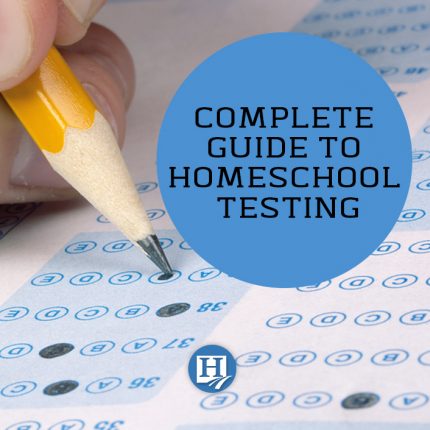State testing for homeschoolers? In fact, should your homeschooling student even participate in end-of-year testing? Of course, that Depends on the state you live in. In short, you may or may not have a choice; some states require assessment tests for homeschoolers but some also do not. So, who has to test?
State Laws for Homeschool Testing
First, before you can decide whether or not you’ll have your students participate in annual testing, you’ll need to know if it’s mandatory in your state.
| Alabama | No testing requirements. |
| Alaska | No testing requirements. |
| Arizona | No testing requirements. |
| Arkansas | Most students are required to take achievement tests selected by the state board of education. Failure to cooperate may result in prosecution for truancy. |
| California | No testing requirements. |
| Colorado | Students must be tested at the 3rd, 5th, 7th, 9th, and 11th grades or receive an evaluation by a qualified person. |
| Connecticut | No testing requirements. |
| Delaware | No testing requirements. |
| District of Columbia | No testing requirements. |
| Florida | Students must be tested or evaluated annually if parents are operating under the state homeschool law (as opposed to an umbrella school). |
| Georgia | Beginning in 3rd grade, students must submit take an a national standardized achievement test every three years. |
| Hawaii | Students in grades 3, 5, 8, and 10 must take a standardized achievement test chosen by parents. |
| Idaho | No testing requirements. |
| Illinois | No testing requirements. |
| Indiana | No testing requirements. |
| Iowa | Students (ages 8+) who aren’t taught by a certified teacher must submit annual assessments (which can be in the form of an exam if desired). |
| Kansas | No testing requirements. |
| Kentucky | No testing requirements. |
| Louisiana | Students taught a “sustained curriculum of quality at least equal to that offered by public schools” must take annual achievement tests but those taught in a home-based private school are exempt. |
| Maine | Testing is mandatory for students educated under the homeschool statute but those taught in a non-approved private school are exempt. |
| Maryland | No testing requirements. |
| Massachusetts | Students must take a standardized test or submit to an alternative (approved) type of assessment. |
| Michigan | No testing requirements. |
| Minnesota | Students must take annual assessments, but the results do not have to be reported. |
| Mississippi | No testing requirements. |
| Missouri | No testing requirements. |
| Montana | No testing requirements. |
| North Carolina | Required on an annual basis for grammar, reading, spelling, English, and math. |
| North Dakota | Students in grade 4, 6, 8, and 10 must take standardized tests administered by a certified teacher. |
| Nebraska | No testing requirements. |
| Nevada | No testing requirements. |
| New Hampshire | Parents must have an evaluation conducted annually, and standardized tests meet this requirement. |
| New Jersey | No testing requirements. |
| New Mexico | No testing requirements. |
| New York | Most students must take a standardized test at certain intervals. There are five to choose from/approved tests. |
| Ohio | Students must satisfy one of the three testing options but may obtain a waiver for “truly held religious beliefs.” |
| Oklahoma | No testing requirements. |
| Oregon | Students in grades 3, 5, 8, and 10 must complete a standardized test. Students who perform below level may be subject to closer monitoring. |
| Pennsylvania | Required for students in grades 3, 5, and 8. |
| Rhode Island | No testing requirements. |
| South Carolina | Students must take annual assessments unless they are either a) members of the South Carolina Association of Independent Home Schools or b) part of a homeschool association with at least 50 members. |
| South Dakota | Testing is mandatory for students in grades 2, 4, 8, and 11. |
| Tennessee | Families my operate their homeschool under one of three options, and testing requirements vary based on the option chosen. |
| Texas | No testing requirements. |
| Utah | No testing requirements. |
| Vermont | Students must be evaluated annually and there are several options to satisfy this requirement. |
| Virginia | No, must provide evidence of academic progress via standardized achievement test or evaluation or assessment. |
| Washington | Annual testing is required but results do not need to be submitted to the school district. |
| West Virginia | Testing is required under the “notice” or “approval” option but there are options in how you meet that requirement. |
| Wisconsin | No testing requirements. |
| Wyoming | No testing requirements. |
Where Can You Find Standardized Testing For Homeschoolers
So, you’ve decided to participate standardized or state testing for homeschoolers. Of course, you may find yourself stuck trying to figure out how to squeeze in homeschool standardized testing, especially the when, and where. While it can feel overwhelming initially, we’ve pulled together the most important pieces of information to make it easier for you!
Of course, that depends on the test your student is taking.
 Some states allow for homeschool to take the state tests in the classroom with public school students. This state testing for homeschoolers must be scheduled through your local school board and school. Contact your local county school board for this option.
Some states allow for homeschool to take the state tests in the classroom with public school students. This state testing for homeschoolers must be scheduled through your local school board and school. Contact your local county school board for this option.
In some cases, you can actually order and administer the state testing for homeschoolers test yourself if you have a four-year degree. For this state testing for homeschoolers option you will need to verify with your homeschool state law and see what testing options that they accept as end of year assessments if you are planning to use it for that. If you are testing for just yourself, then go ahead and test away!
Also, many homeschool support groups provide state testing for homeschoolers services. For this, parents get together each year and have a Test Day for the students. In those cases, one of the parents (or hired help) is certified to administer the state testing for homeschoolers to all students. Often, this person holds a current teacher’s certification perhaps from a former career. To find out if this is an option for you, reach out to a local homeschool group.
Additional Alternatives for State Testing For Homeschoolers
Another option for affordable homeschool testing is to become a certified Test Administrator through Bob Jones and have your student take the Stanford-10 Achievement Test. To do this, you must hold at least a four-year degree. You then fill out the standardized testing online application and watch the training video.
Finally, there are many online options for homeschool standardized testing. Seton Testing offers the Stanford-10 for students in grades 3-12 (worldwide). In addition, Homeschool Testing Services (HTS) offers tests both online and on-site at various approved locations. HTS offers the CTP for students in grades 1-10 and the Stanford-10 for grades K-12. If taking timed tests isn’t ideal for your student, consider the CAT (California Achievement Test) through Academic Excellence.
Standardized testing is useful for homeschooled students, though it’s not required in all states. It provides parents with clarification on how their students are doing academically, and it prepares students for high-stakes tests like the SAT and the ACT. In the end, your student will be able to put another year of schooling behind him or her!
Tasha Swearingen
Tasha is a homeschooling mom to 5 and has been homeschooling for 14 years. Currently, her children's ages span from toddler to young adult. Tasha has a Bachelor's of Science degree in Social Sciences from Florida State University and is working on her MBA through SNHU/Berklee School of Music.
Latest Posts

Guest Post by Gabriel Morse For several years, I sat for long hours every day behind one of those battleship gray desks in a windowless, dull, gray office. The pay was enough to take care…
Read more >
This post is sponsored by Little Monsters Universe. I'm Tina Salmanowitz, an advocate for homeschooling and science education. With over a decade of experience as a science educator (in class…
Read more >
This post is sponsored by Time4Learning. Before the pandemic, it was business as usual for Boca Raton resident Nikki Warris. Her two daughters, 5-year-old Natalie and 8-year-old Lexi were…
Read more >


